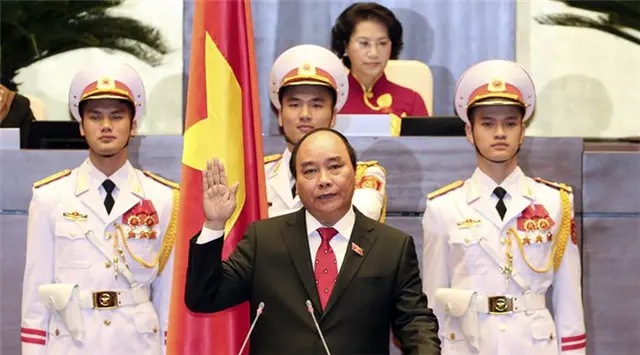With a total of 446 "yes" votes out of the 490 valid ballots cast by deputies of the Vietnamese National Assembly, former Deputy Prime Minister Nguyen Xuan Phuc was elected the country's new prime minister on Thursday.
Phuc's election as the new head of government marked the completion of the Southeast Asian country's latest round of leadership reshuffle, during which the National Assembly's former Deputy Chairwoman Nguyen Thi Kim Ngan was elected its chairwoman, and former Minister of Public Security Tran Dai Quang the country's new president.
The newcomers of the top Vietnamese leadership are expected to work along with re-elected Communist Party of Vietnam (CPV) chief Nguyen Phu Trong to seek new breakthroughs for the country and to bring benefits to its people.
Birth of a new leadership
Convened from Jan. 21 to Jan. 28, the 12th National Congress of the Communist Party of Vietnam elected a 200-member CPV Central Committee, whose members then elected a new Politburo, the General Secretary and the Secretariat of the 12th CPV Central Committee (CPVCC).
Nguyen Phu Trong, born in 1944, was elected General Secretary of the 12th CPVCC. He had served as general secretary of the 11th CPVCC since 2011.
The meeting paved the way for the establishment of a new Vietnamese leadership.
By the conclusion of the second Central Committee meeting of the 12th CPV National Congress in early March, the CPVCC agreed to replace and re-arrange key leadership positions in the upcoming 11th and final session of the 13th National Assembly on March 21.
New faces
"I will try my best to serve the nation and the people, all for the goal of building a socialist country of Vietnam with rich people, strong nation, democracy, equality and civilization," Nguyen Xuan Phuc said at the National Assembly after being elected prime minister on Thursday.
Phuc, born in 1954, holds a bachelor's degree in economics and has served in positions of the Vietnamese government at different levels with an outstanding reputation.
The newly-elected cabinet chief also pledged to speed up innovation and international integration, make efforts to realize goals of socioeconomic development tasks, and increase the effectiveness of anti-corruption work, among others.
On March 31, the National Assembly deputies elected Nguyen Thi Kim Ngan the country's first female house speaker with 472 "yes" votes out of the 481 valid ballots, making her the first woman to ascend into Vietnam's top level of leadership.
She was also elected as chairperson of the National Election Council.
Ngan pledged to join hands with members of the National Assembly Standing Committee to "take a lead and perform well tasks of the highest organ of power of the people and the highest organ of power of the Socialist Republic of Vietnam."
On April 2, Tran Dai Quang, born in 1956, was elected Vietnamese president with 452 "yes" votes out of the 481 valid ballots.
Quang told the Vietnam News Agency after his election that he would make all-out efforts to fulfill the duties of the State leader, and will steer the construction of the regular, elite and modern people's revolutionary armed forces, so as to "firmly safeguard the country's independence, sovereignty and territorial integrity, along with political stability and peace for national development."
He also pledged to optimize external resources to develop the country and enhance peoples' lives.
New challenge
The 12th National Congress of the CPV set up new goals for Vietnam's 2016-2020 socioeconomic development plan, including quickly turning Vietnam into a modernity-oriented industrialized country.
On the opening day of the 11th session of the 13th National Assembly, then Deputy Prime Minister Nguyen Xuan Phuc put forward three strategic breakthroughs that Vietnam has to achieve in the foreseeable future, including improving a socialism-oriented market economy, promoting the modernization of infrastructure, and optimizing human resources.
Phuc also set the growth rate of the gross domestic product (GDP) in the next five years at 6.5 percent to 7 percent.
Given Vietnam's economic status quo, those targets, however, could be rather challenging tasks for the new leadership.
Vietnam has been faced with factors of growing uncertainties in economic development. For example, the growth rate of both the industrial production index and the GDP in the first quarter of 2016 decreased in comparison with the same period of last year. The slowdown of foreign trade, drop of crude oil prices as well as a drought-led reduction of rice yields also made crucial impact on the country's fiscal revenue.
Consolidation of china-vietnam relations
As neighboring countries with a comprehensive strategic cooperative partnership, China and Vietnam have achieved remarkable development in bilateral relations, including in areas of trade and economy, culture, people-to-people exchanges, defense and law enforcement.
In 2015, bilateral trade between China and Vietnam reached a record high of 95.82 billion U.S. dollars. China has been the biggest trade partner to Vietnam for the past 12 consecutive years, and Vietnam became the second-biggest trade partner to China in the Association of Southeast Asian Nations (ASEAN) in 2014.
"China and Vietnam are two close neighbors and brothers," noted Hong Xiaoyong, the Chinese ambassador to Vietnam, at a reception held on Jan. 14 in Hanoi to celebrate the 66th anniversary of the establishment of diplomatic relations between China and Vietnam.
"No matter how the international situation changes, the importance of maintaining and developing the traditional friendship between the two countries is unchanged, as it is in line with the fundamental interests of the two peoples," said Hong.
 简体中文
简体中文










